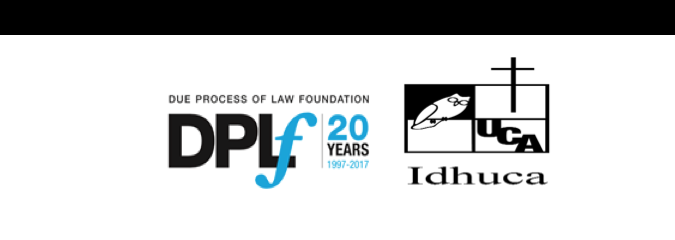
On June 5, 2017, the Due Process of Law Foundation (DPLF) and the Instituto de Derechos Humanos de la Universidad Centroamericana José Simeón Cañas (IDHUCA) presented an amicus brief before the criminal court in charge of the El Mozote case after the reopening of the investigations in September 2016. At the moment 18 former military members have been accused of nine crimes, according to law in force at the time of their commission, including homicide and rape.
This is the first criminal investigation reactivated after the Amnesty Law was declared unconstitutional in August 2016 and the only one from the armed conflict that seems to be advancing.
The El Mozote massacre refers to a series of murders against civilian populations of the villages of El Mozote, La Joya, Los Toriles and others in the north of the Morazán department committed by the Atlacatl battalion of the Salvadoran Armed Forces during a military operation on the 10th, 11th and 12th of December 1981.
According to the UN Truth Commission for El Salvador, approximately 900 men, women, and children were murdered during the military operation. It is considered to be the worst massacre ever perpetrated against civilians by state actors in Latin America.
In December 2012, The Inter-American Court of Human Rights held that the events of the massacre were grave human rights violations and that they qualify as international crimes.
Along the same lines, the purpose of the amicus brief is to demonstrate that it is possible to charge those responsible for the events using the Criminal Law Code of 1973 (for the crimes of murder and aggravated rape) and at the same time to apply international law (war crimes or crimes against humanity) for a “double charge” (doble calificación), without violating the principle of legality.
This double charge would have an important symbolic effect on the victims and the society, as it would reflect the gravity of the crimes and the international importance of the massacre. The El Mozote massacre was a generalized attack against a civilian population as part of an extermination policy, and not an isolated event.
This is the first time that an amicus brief has ever been filed before a national criminal court in El Salvador. Amicus briefs are presented in cases of collective interest -like the El Mozote massacre- by independent experts who are not part of the process, to contribute specialized knowledge and legal arguments for an improved debate. The presentation of amicus briefs is a common practice in several countries as well as within the Inter-American Court of Human Rights and the International Criminal Court procedures.
DPLF and IDHUCA hope that this contribution will be carefully considered by the judge on the decisions he will take based on domestic and international law.
See the amicus brief here





